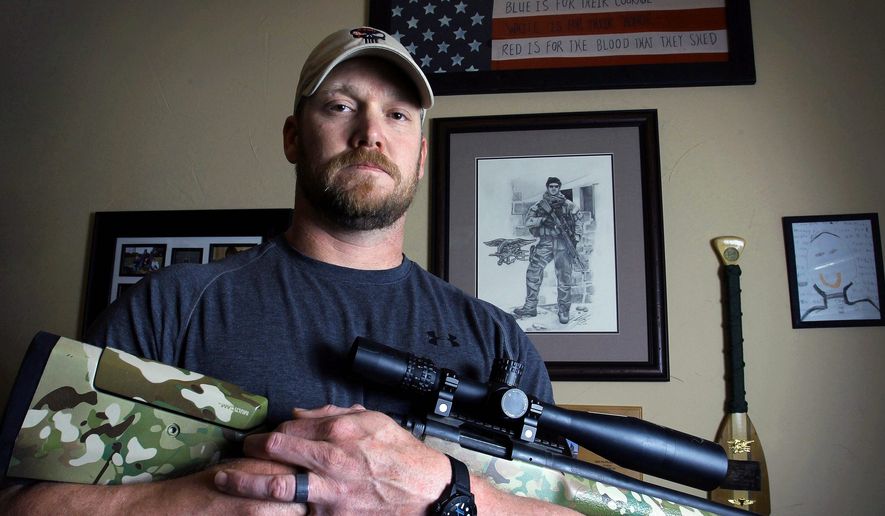OPINION:
From the Alamo to Audie Murphy, Texans revere our war heroes. As the closing credits for “American Sniper” rolled across the screen last weekend, a packed audience lingered in the dark silence, reverent and maybe stunned by what they had just seen. The reason: The movie depiction of Navy SEAL Chris Kyle’s heroic life of service provided an increasingly rare glimpse of what were once unquestioned American truths.
It begins with the bedrock values imparted by a loving, two-parent family who believed their first obligation was training their young sons to be honorable men. Raise your children in the way they should go, Proverbs says, and when they are old, they will not depart from it. That truth holds even when their country is attacked, and only 1 percent of their countrymen feel any personal obligation to defend it. Even then, though, America’s sons will step forward, volunteering to join that increasingly endangered species of patriots who put themselves in harm’s way.
They do so time and time again. The movie is punctuated by the bitter truth of the new American way of war: Leaders calling for repetitive combat tours in Old Testament hellholes using other people’s kids. While your children and mine were off at college securing their first down payments on the American dream, those other kids like Chris Kyle were providing the boots on the ground that have always been the essential down payment on American freedom.
As a superbly trained SEAL sniper, Chris usually provided the over-watch protection for Marines sent forward to engage the enemy at close range. While showing little gratuitous violence, the movie is explicit about the moral ambiguities of combat. Although the mission of force protection may be clear, what do you do when your target is a 10-year-old boy carrying an anti-tank weapon or a rocket-propelled grenade? And if you guess — correctly as it turns out in Kyle’s case — that they are deadly threats, then how do you live with yourself afterward? Are you are haunted by the insurgents you glimpsed down the end of that sniper’s scope? Or is that guilt offset by pride in saving the lives of countless American soldiers? Even if it is, does the Department of Veterans Affairs have an office where absolution is given?
Even after Sept. 11, we kept those profound moral choices and invitations for self-sacrifice at a safe distance from the 99 percent of Americans whose wartime experiences were limited solely to the electronic coliseums of movies and TV. We proudly boasted that our defenses were manned solely by volunteers, without ever once coming to grips with the harder truth: Our future leaders may have Harvard degrees, but they will probably not been shaped by the shared experience of war or its remembrance. Even if you only skimmed “The Federalist Papers” back when high schools still taught civics, wasn’t national defense supposed to be something more than a spectator sport? And what happens when those future leaders who have never been in a foxhole have to deal with truly deadly threats like the Islamic State? Will they even recognize what they’re seeing?
Many voices eloquently recall Martin Luther King Jr. while worrying about the racial divisions that separate Americans. Anyone seeing “American Sniper” will be forcibly reminded that our military is one of the few institutions where race is trumped by merit — each day and with a certain amount of irony. It is a family where the only acceptable form of discrimination is the shared disdain that combat elites have for POGS (People Other than Grunts).
Today’s “band of brothers,” however, is given even greater solidarity by the widening gulf separating American society from those who defend us. What a shock for the ordinary citizen to realize that military spouses and children also suffer from a manpower system in which the average U.S. soldier has been deployed on three or four combat tours. Daddy or Mommy redeployed to Kandahar doesn’t get to attend Boy Scout meetings or see their daughters in ballet recitals. With fewer and fewer soldiers available, we do more and more with less and less. Exactly like radiation, post-traumatic stress disorder hanging like a dark cloud over each scene in “American Sniper” is simply a result of prolonged exposure to danger, an impending disaster no longer left to chance.
Both sides of the political spectrum in this country share a studied indifference to the sacrifices once assumed as a common burden. The right worries that resuming the draft or even thinking about national service would just mean more big government. The left has an instinctive dread about diverting their little darlings away from Harvard. Why even think about all that when other people’s kids like Chris Kyle are performing so heroically?
• Ken Allard, a retired Army colonel, is a military analyst and author on national-security issues.




Please read our comment policy before commenting.